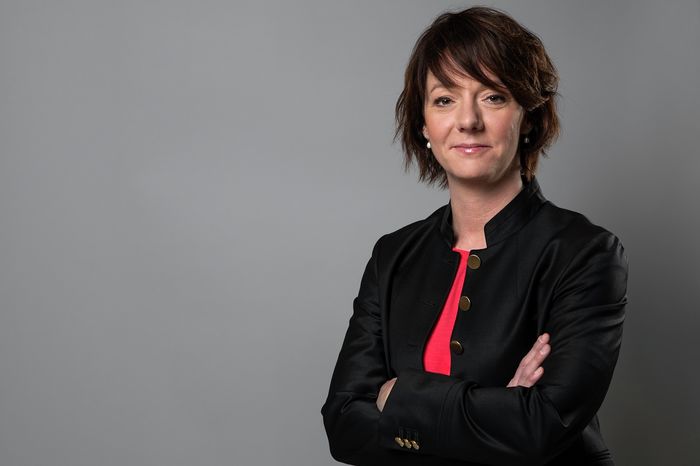‘Constant dialogue and close collaboration’: how Denmark handled higher education in 2020
In the third article of our series exploring how governments across the world approached university policy this year, Victor Jack speaks to Denmark’s Minister for Higher Education and Science, Ane Halsboe-Jørgensen

Amid sharply rising cases, mushrooming hospitalisations – and ongoing mink scandals – Denmark insists it has not forgotten its university students.
A range of new initiatives including employer partnerships, legislation on loans and a ‘mental health summit’ are at the top of the agenda, says Ane Halsboe-Jørgensen, Danish Minister for Science, Technology, Information and Higher Education.
“It is an important priority to help our students in these uncertain times [who] have no influence on how the pandemic will evolve,” she says, “we have a duty to aid them.”
In Spring, Denmark was Europe’s poster child for a pandemic response. Prime Minister Mette Frederiksen drew praise for taking tough decisions early and on March 11th, universities shut their doors. But partial activity resumed soon after for some research and courses with practical elements, followed by full reopening in Autumn.
“Both students and institutions have shown great readiness for change”
“Both students and institutions have shown great readiness for change”, says Halsboe-Jørgensen. “We are striving to ensure that all students regularly attend the institutions physically, for the sake of their own well-being.”
But with well over 2500 new cases reported per day since mid-December and 879 currently in hospital with Covid-19, pressure on its healthcare system is growing. Meanwhile, the government is embroiled in scandal following its decision to kill 17mn mink infected with a mutated strain of the coronavirus, as burial sites are dangerously near to water supplies and carried out without an impact assessment.
On December 16th, Frederiksen announced a new national lockdown, effective from Christmas day until at least early January.
Halsboe-Jørgensen stresses the government is “willing to go a long way” to keep universities open, though admits it would “consider” shutting them down “if the level of infection increases, in order to protect the population”.
“During the shutdown and the subsequent reopening, I made it a strong priority to engage in a close dialogue with students and management in higher education,” she says.
During the initial lockdown, Halsboe-Jørgensen took steps to create an official partnership body with representatives from local authorities and universities to help guide Covid-19 policies that emphasise local responsibility and allow for varying conditions among universities.
“Constant dialogue and close collaboration with the higher education institutions have been crucial,” she says.
Though Halsboe-Jørgensen feels it is “too early” to say which countries handled the pandemic well, she says she has “taken inspiration” for these policies from EU meetings and the Nordic Council. “I have been in direct contact with many of my European counterparts to exchange views”.
The pandemic has also left many young Danes without jobs, with 15-24 year-olds making up 12.3% of the unemployed workforce in October, compared with 9.9% in February.
“It has been a priority for the Danish government to ensure that students will not be forced to drop their education for financial reasons,” says Halsboe-Jørgensen. To prevent this, she helped pass an amendment to Denmark’s student grant law, which will allow students with fewer financial means to take out extra loans.
In recent years, Denmark has also become known for its phenomenon of ‘eternity students’ – evighedsstuderende – students who stay at University for 6 years. Denmark’s State Educational Grant and Loan Scheme – ‘SU’ and ‘SU-lån’ – creates little financial incentive for some students to graduate, given the country’s free tuition and student monthly allowance of around $1000.
“All young people – irrespective of social status ... [should] have equal access to education”
Despite partial reforms in 2015 meant to end this, the trend continues. But Halsboe-Jørgensen says there are no plans to amend this further in the context of a possible looming recession following the pandemic.
“It is – and has always been – very important for the Social Democratic government to ensure that all young people – irrespective of social status, economic situation and other circumstances – have equal access to education – also higher education,” she says.
But she emphasises demands on students’ study progress for grants and loans have not been relaxed, and expectations for “active participation” in university courses continue.
For those on the brink of graduating into a volatile job market, Halsboe-Jørgensen has also set up a partnership of 27 actors across sectors, who have joined together to create practical initiatives which bolster graduates’ portfolios seeking employment.
“Graduate unemployment is a general problem, but the pandemic has exacerbated the situation,” says Halsboe-Jørgensen. “That is why joint action is important.”
Some estimates argue that in 2021 more than 243,000 unemployed – more than 4% of the population.
Denmark’s robust unemployment benefit system and the comprehensive economic support programme introduced this year for the private sector, she stresses, will indirectly help graduates too.
“It has been a priority,” says Halsboe-Jørgensen, “so we still have a very strong and healthy private sector when, hopefully sooner than later, we see the end of this horrible pandemic.”
“A well-educated population ... is a prerequisite for Danish companies, to cope with tougher global competition”
Students’ mental health is a growing concern too, especially as a 2017 government report found one in five 16-24 year-olds experience poor mental wellbeing.
“Young people, and especially students, were one of the most stressed and lonely groups in Denmark even before the pandemic,” admits Halsboe-Jørgensen, “of course the current situation affects the mental health of young people a lot”.
She argues she has kept close contact with student organisations in the pandemic to monitor developments in mental health. In April, when the government passed DKK215mn package to protect “the most vulnerable” across the country, the Ministry ensured at least DKK5mn was reserved for vulnerable students, such as those at risk of dropping out.
Halsboe-Jørgensen is also planning a ‘mental health summit’ with young people on the subject of their mental health during the pandemic.
“The focus of this summit will be on alternative activities for young people and students, so they can meet up, interact and have fun without contributing to any increased spread of the virus.”
“Online teaching has brought about something good and of educational value, and at the same time it has increased our focus on how important the social aspects of education are”.
Many of the Social Democrats’ programme have been cut short this year due to the pandemic, but Halsboe-Jørgensen argues her plans for higher education are “still feasible – and perhaps more relevant” now.
“A well-educated population becoming increasingly skilled is a prerequisite for Danish companies to be able to cope with tougher global competition,” she says. “Therefore, it has been a priority for the government to stop the savings on education that the previous [conservative] government introduced, and which reduced the quality of education”.
Strengthening Danish welfare programmes in fields such as nursing, teaching and education is still ongoing.
“Skilled teachers and social educators are vital to the future of our children, and nurses, midwives and social workers have a central role to play in our welfare society.”
And in the long-term, Halsboe-Jørgensen argues her pandemic initiatives and closer links between students, the Ministry and employers may lead to closer connections and more consultation-based policy.
“This unforeseen situation has brought together the whole sector, as well as the Ministry and the institutions, which I believe will be fruitful for our future collaboration.”
 News / Downing Bar dodges college takeover31 January 2026
News / Downing Bar dodges college takeover31 January 2026 Comment / College rivalry should not become college snobbery30 January 2026
Comment / College rivalry should not become college snobbery30 January 2026 Fashion / A guide to Cambridge’s second-hand scene2 February 2026
Fashion / A guide to Cambridge’s second-hand scene2 February 2026 Lifestyle / Which Cambridge eatery are you?1 February 2026
Lifestyle / Which Cambridge eatery are you?1 February 2026 News / Deborah Prentice overtaken as highest-paid Russell Group VC2 February 2026
News / Deborah Prentice overtaken as highest-paid Russell Group VC2 February 2026









